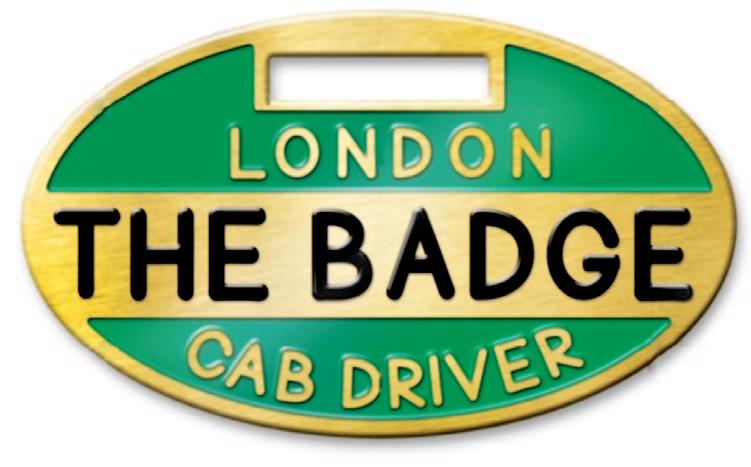







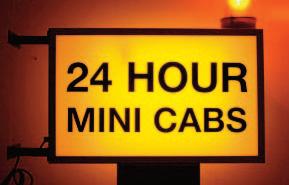



















Published by
The London Cab Drivers’ Club Ltd.
Unit A202, Tower Bridge Business Complex
Tower Point, 100 Clements Road
Southwark, London SE16 4DG
Telephone: 020 7394 5553
E-mail for membership enquiries: E-mail: thelcdc@gmail.com Web: www.lcdc.cab
Editor: Grant Davis
The Badge is distributed free to the Licensed London Cab Trade.
For advertising enquiries please contact the office on 020 7394 5553 or E-mail: thelcdc@gmail.com
All advertising in The Badge is accepted under our terms and conditions. These are available at the LCDC office.
Before entering into any commitment, financial or otherwise, always remember to seek professional advice.
The views expressed in this publication are not necessarity those of the Editor or of the Management Committee of the London Cab Driver’s Club.
Contributions for publication are welcomed and should be sent to the Editor at the above address.
The London Cab Drivers’ Club Ltd.
Printed by Iliffe Print. T: 01223 656500 www.iliffeprint.co.uk
Now the kids are all back at school, I hope work levels improve and we can all get our heads down and graft until Christmas... ( did I really say Christmas!).
As I write this, over 200 taxi drivers have given up a long weekend to take sick children to Euro Disney and on behalf of the LCDC, I would like to applaud everyone who made the trip, you are a real credit to our trade.
Like you all, driving around the capital, it's really upsetting to see the state of the place, tents on Park Lane, gridlock traffic... the list goes on, how depressing, it’s utter Khanage.
On the front page you can see Elly Baker, the new Chairman of the GLA Transport Committee.
Myself and Mark White had a very "early doors" meeting with her to discuss everything Taxi and like us, she confided that she does not think TFL are doing a very good Job with the taxi trade and agreed with my view that they are... "just managing us", I would go further and say TfL are managing us into a steady decline, they have NO idea of our struggles, the KOL, and any forward thinking on the trade and I strongly believe it should be the taxi trade who tells TfL
what we need to survive and prosper and as our Regulator, they go and just do it.
If you want a good laugh then go to page 7 where LCDC Com member Danny O'Regan informs us that the PH Associations want TfL to make it a PH regulation that any job sent to a PH driver, he HAS to cover it... the reason is if the PH Companies tell their drivers they have to cover every job they are sent, they would be liable for all the driver benefits... pension, sick pay etc etc... but getting TfL to bring it in gets them all off the "benefits" hook... what a joke.
I hope you all enjoy the Badge this month and I must say a very big welcome to all our new members that have joined since the last edition. With a City of London legal team with a 100% record, PCN, Complaints from TfL, personal appeal hearings and a team of Com members who all work the cab full time, including myself, you know if it bothers you... it bothers US!
See you out there.
Grant



Suite 12, Temple Chambers, 3, Temple Avenue, London EC4Y 0HP
We at the LCDC don’t often bang our own drum when it comes to helping our members with their legal troubles. A lot of the cases which come our way with members are quite sensitive and we respect their wishes to keep things in house and out of the paper which I can fully appreciate.
However, not only do Payton’s Solicitors offer our members a 24 Hour Duty Solicitor 365 days a year, but since getting involved with the Club, our solicitor Keima Payton has the distinction of having a 100% success rate in all her cases which she has handled on behalf of the Club’s members.
Keima Payton has a fearsome reputation in court and should ever the need arise you will find no one better able to fight your corner and save your Badge than Keima.
- Grant Davis, LCDC Chairman
Tel: 0207 405 1999 FAX: 0207 405 1991
On 11th September we had the privilege of meeting with Elly Baker, Labour’s Transport Spokesperson at the London Assembly, to present our latest report titled ‘The Decline of London’s Black Cabs’.
This report outlines the significant challenges the iconic black cab trade has been facing, particularly due to the lack of substantial support from Transport for London (TfL).
Our discussion with Ms Baker was constructive and focused on the urgent need for TfL to take action in recognising and tackling the growing issues within the industry.
Despite the critical role black cabs play in offering a safe, accessible, and highly knowledgeable service across London, TfL’s policies have increasingly disadvantaged our trade.
This has become especially apparent with the rise of private hire vehicles, restricted access to central areas, and limited assistance for drivers transitioning to electric vehicles (EVs).
Key Points of Discussion:
1. Unfair Competition from Private Hire Vehicles:
One of the primary concerns raised was the rapid expansion of private hire vehicles, particularly appbased services, which operate under far less stringent regulations than black cabs. Many of these services flood the market with lower fares and more lenient standards, leaving black cab drivers struggling to compete.
2. Limited Access to Central London:
Changes in road layouts, coupled with schemes like Low Traffic Neighbourhoods (LTNs) and the creation of new cycle lanes, have drastically


reduced black cab access to key areas of the city. This has not only affected drivers’ earnings but also inconvenienced passengers— especially those with disabilities—who depend on our service for accessible transport.
3. Inadequate Support for Electric Vehicle Transition: While the transition to electric vehicles is necessary to help improve air quality in London,
TfL’s support has been insufficient. We highlighted the high costs associated with purchasing electric taxis, the shortage of charging infrastructure, and the lack of a comprehensive plan to assist drivers in making this vital switch without jeopardizing their livelihoods. Ms Baker demonstrated genuine interest throughout our conversation, acknowledging the crucial role black cabs play within
London’s transport ecosystem. She agreed that more must be done to ensure the trade remains sustainable and pledged to escalate our concerns to the appropriate authorities. We left the meeting encouraged that, through continued dialogue and pressure, the black cab trade may finally receive the support it needs to remain a vital part of London's identity. As always, we will persist in
advocating for the rights of our members and holding TfL accountable for the impact of its policies on our industry. We extend our sincere thanks to Elly Baker for her time and dedication to this issue, and we will keep you informed on future developments.
Together, we will keep London moving. Stay safe, Grant
Introduction:
The iconic Black Cabs of London, a vital part of the city's public transport network, are facing a critical decline. This report explores the underlying factors contributing to this decline, focusing on the role of unfair competition, regulatory arbitrage, and the externalisation of costs to the public purse.
Key Factors Contributing to the Decline:
1. Unfair Competition: - Regulatory Differences:
Black Cabs adhere to stringent regulatory standards, including the Knowledge of London test, which ensures drivers have an in-depth understanding of London’s streets. In contrast, private hire drivers are only required to pass a basic topographical test, which is considerably less rigorous.
- Operational Costs:
Black Cabs face higher operational costs, including licensing fees, vehicle specifications, and insurance premiums. Private hire vehicles operate under more lenient conditions, allowing them to offer lower fares and attract more customers.
2. Regulatory Arbitrage: - Tax Avoidance:
Many private hire companies, especially multinational corporations, engage in regulatory arbitrage to minimise their tax liabilities. They employ complex corporate structures to shift profits to low-tax jurisdictions, thereby avoiding higher taxes that Black Cab operators cannot escape.
- Employment Practices:
Private hire companies often classify drivers as

independent contractors rather than employees, avoiding payroll taxes and benefits obligations. This practice reduces their operating costs but undermines the job security and benefits for drivers.
3. Externalisation of Costs: - Public Infrastructure:
The increased number of private hire vehicles places additional strain on public infrastructure, including roads and traffic management systems.
The maintenance costs are borne by the public sector, indirectly subsidising private hire operations.
- Environmental Impact:
Private hire vehicles contribute to higher levels of traffic congestion and pollution. The environmental costs, including health impacts and pollution mitigation, are externalised to the public, while private hire companies do not bear the full cost of their environmental footprint.
4. Overcrowded Roads:
- Traffic Congestion:
The sheer number of vehicles vying for limited road
space in London has exacerbated congestion. This issue is compounded by the reduction in available road space due to the introduction of cycling lanes, road closures, and low traffic neighbourhoods (LTNs).
- Environmental Goals:
The Mayor’s initiative to improve air quality and increase pedestrianised areas further highlights the need to manage vehicle access to central London.
Reducing the number of private motorists and private hire vehicles can help achieve these goals.
5. Driver Standards and Safety:
- Vision Zero:
Implementing higher driving standards is crucial for reducing road deaths. Introducing driving tests for private hire drivers, as promised in 2016, and reintroducing tests for Black Cab drivers will ensure higher safety standards.
- In-Vehicle Technology:
Better implementation of driver despatch systems and integrated satellite navigation systems that prevent drivers from interacting with mobile
convenience. This shift in consumer preference further exacerbates the decline of Black Cabs.
Importance of Black Cabs:
- Essential Public Transport:
Black Cabs are an integral part of London’s public transport network, providing reliable and accessible services to residents and visitors alike.
- Accessibility:
smartphones will enhance road safety and service reliability.
- Mobile Phone Use:
The Mayor of London, Sadiq Khan, promised the former Chair of the GLA Transport Scrutiny Committee, Caroline Pidgeon, to improve the use of mobile phones and technology in the taxi and PH industry by introducing accelerometer software to stop drivers from using phones while driving.
Distracted driving is as dangerous as drug or drunk driving.
Impact on the Black Cab Industry:
- Financial Viability:
The cumulative effect of regulatory differences, tax avoidance, and cost externalisation makes it increasingly difficult for Black Cab operators to remain financially viable.
The higher operational costs and stringent regulations erode their competitive edge.
- Market Share:
Private hire vehicles have captured a significant market share by offering lower prices and leveraging technology for
Black Cabs are wheelchair accessible and offer services that meet the needs of all passengers, including those with disabilities.
- Safety and Reliability:
Black Cab drivers are highly trained and regulated, ensuring a safe and reliable service across the city.
Recommendations for Regulatory Reforms:
1. Level the

Playing Field:
- Uniform Standards:
Implement more consistent regulatory standards for both Black Cabs and private hire vehicles. This includes similar licensing requirements, vehicle standards, and safety regulations to ensure fair competition.
- Tax Reforms:
Close all tax loopholes that allow private hire companies to avoid their fair share of taxes. Ensure that all
operators contribute equitably to public revenues.
- Employment Standards:
Mandate that private hire companies provide benefits and protections to their drivers, ensuring fair treatment and reducing the cost advantage gained through exploitative employment practices.
2. Address Cost Externalisation:
- Infrastructure Costs:
Introduce measures to ensure private hire companies contribute to the maintenance and development of public infrastructure. This could include specific levies or charges based on the usage and impact on public roads.
- Environmental Levies:
Implement environmental levies (licence fees) on private hire vehicles to cover the costs of pollution and traffic congestion. Funds collected can be used for environmental mitigation efforts and public health initiatives.
3. Reduce Vehicle Numbers in Central London:
- Access Restrictions:
Restrict access for private motorists, private hire vehicles, and delivery services to central London areas, prioritising taxis and public transport to reduce congestion and pollution.
- Pedestrian Zones:
Expand pedestrianised zones and improve infrastructure for walking and cycling to support the Mayor’s environmental goals.
4. Support for Black Cabs:
- Financial Assistance:
Provide financial assistance and incentives for Black Cab
operators to upgrade their vehicles to more environmentally friendly options, reducing their operational costs and environmental impact.
- Technological Integration:
Encourage the adoption of technology by Black Cab operators to enhance service convenience and competitiveness, including app-based booking systems and cashless payment options.
5. Regulation of Delivery Services: - Licensing and Regulation:
TFL should lobby for the authority to regulate and licence the delivery industry, including companies like Amazon, Deliveroo, and Uber Eats. These services contribute significantly to traffic congestion and environmental impacts.
- Operational Standards:
Establish operational standards for delivery vehicles, including safety (eg Driving Tests), emissions, and road usage regulations (eg Business Insurance). Ensure these services contribute to the maintenance of public infrastructure and comply with environmental standards.
6. Support for Disabled Access:
- Taxi Card Scheme:
Ensure the Taxi Card scheme is exclusively for Black Cabs, which are more likely to be wheelchair accessible. Subsidise the scheme using private hire licence fees to support disabled passengers.
- WCA Requirements:
Raise standards for private hire vehicles to include a
higher proportion of wheelchair-accessible vehicles (WAVs). Only allow WAVs, whether taxi or private hire, to service local and government healthcare service accounts.
7. Enhanced Safety Standards: - Driving Tests:
Introduce driving tests for private hire drivers and reintroduce tests for taxi drivers to ensure higher safety standards and reduce road fatalities as part of the Vision Zero initiative.
- In-Vehicle Technology:
Implement better driver despatch systems and integrated satellite navigation systems that prevent drivers from interacting with mobile smartphones, enhancing safety and service quality.
- English Proficiency Tests:
Ensure all drivers, both taxi and private hire, pass English proficiency tests to guarantee clear communication with passengers, particularly benefiting tourists and nonEnglish speakers.
- Safeguarding and Disability Awareness:
Mandate safeguarding and disability awareness training for all drivers to protect the most vulnerable members of society. This includes understanding the needs of passengers with disabilities and recognising signs of abuse or distress.
8. Recognition as Public Transport: - Access to All Roads:
Taxis need to be considered as public transport and allowed access to all roads by traffic and city planners. This ensures they can provide
efficient services across London without unnecessary restrictions.
- Taxi Ranks Plan:
Review the Taxi Ranks Plan and create more Rest Areas (Hubs). Establish rest areas (hubs) for taxis where drivers can charge and refuel vehicles and rest while doing so. These hubs should include toilet facilities, free parking, and food services, considering the nature of the job and the high risk taxi drivers face from health issues like bowel cancer, diabetes, and heart attacks due to lack of facilities.
- Strategic Placement:
Planners should include hubs at every point of the compass (N, S, E, W) inside the M25.
Additionally, consider purchasing taxis to lease to drivers to benefit from bulk buying and tax concessions or help drivers buy via cheaper finance loans and prices.
9. Expansion and Support in Suburban Areas:
- Increase Taxi Presence:
Increase the number of taxis in suburban areas of London and ensure that there are taxi ranks outside every rail/tube station, shopping centre, and high street.
- Review Suburban Taxi Service:
Conduct a comprehensive review of the suburban taxi

service to identify areas for improvement and ensure adequate coverage and service quality in these regions.
10. Enhanced Knowledge Requirements:
- Topographical Tests for PHV Drivers:
A private hire driver should have to pass a topographical knowledge test for the area they specify they wish to operate in and only work in that area. This ensures drivers are knowledgeable about the local geography and can provide efficient services.
- Address CrossBorder Hiring:
Ensure licensing has an element of localism so that taxis and private hire vehicles can only pick up or drop off in their licensed areas. Bookings must be taken in the predominant area of the licence.
- Knowledge Test Standards:
Private hire drivers should pass topographical knowledge tests equivalent to the minimum standard of an all-London green badge taxi driver in suburban London and the equivalent of a yellow badge suburban driver in central London or in suburban areas that are not their dedicated area.
Bronze, Silver, Gold levels of the Taxi and PH Education System


A recent Freedom of Information disclosure from Transport for London makes for interesting reading.
At the Senior PHV quarterly meeting on 14 June 2023, the chairman of the Licensed Private Hire Car Association raised the issue of private hire drivers cancelling trips allocated to them by their operator.
The meeting notes state:
"SW expressed concern about PHV drivers cancelling trips that had been allocated to them when offered a better fare, which is a safety concern as passengers are left stranded. SW felt that once a driver had agreed to undertake a journey, they should fulfil it."
This rightly highlights significant safety concerns. Imagine, for instance, a lone female waiting on the street late at night, expecting a vehicle to arrive, only for the driver to cancel the trip.
At first glance, readers might think that operators raising this issue are being public-spirited and genuinely concerned for passenger safety.
However, we might ask: why are operators bringing this up with TfL when they have the power to address the issue themselves?
Could it be that they are hoping TfL will impose regulations to restrict this practice?
From the December 2021 Divisional Court judgment, we know that, in order to operate lawfully under the Private Hire Vehicles (London) Act 1998, a licensed operator who
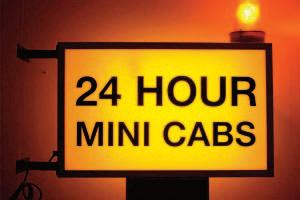
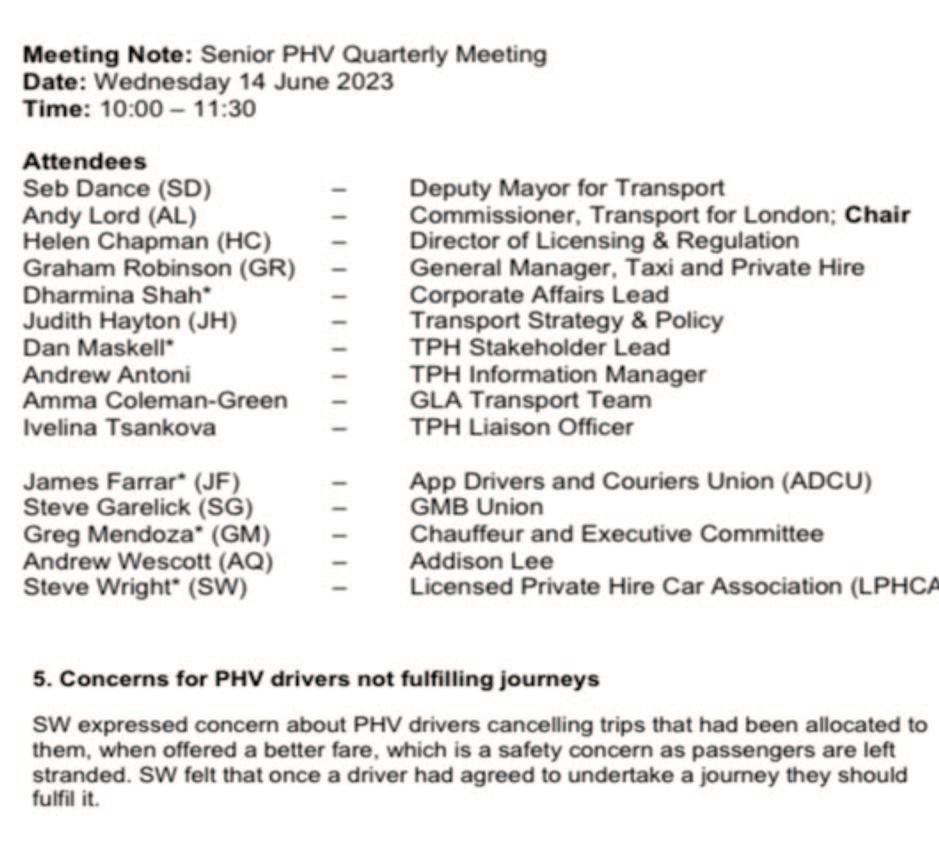
accepts a booking from a passenger is required to enter, as the principal, into a contractual obligation with the passenger to provide the journey in question. In short, it is the operator who makes the provisions and the operator who accepts the booking.
Operators also have contracts with their drivers. In theory, it would be possible for them to either restrict cancellations or compel drivers to accept trips. Of course, there are valid reasons for cancelling, such as a vehicle breakdown, but these are rare occurrences that could be accounted for in driver contracts. In effect, they could utilise and manage their fleets more efficiently. This would also have a benefit on congestion and the environment.
One possible reason operators are reluctant to restrict or compel drivers may relate to worker rights. The level of control an operator exerts is a key factor in determining a driver's employment status. Imposing restrictions could lead to drivers being classified as workers or full employees, which would carry obvious financial implications for the operators.
However, if TfL were to introduce regulations restricting driver cancellations, it wouldn’t be the operators exercising control; it would be a regulatory requirement. And that would be quite convenient for them.
If operators are indeed reluctant to enforce such measures due to potential financial implications, then we must ask: are they prioritising profits over public safety?

That’s what I was told by some drivers at traffic lights when I started the Knowledge in 1978.
It wasn’t; not any more than when these drivers’ great, great grandfathers said it to a driver new to driving a horse-drawn carriage. There will be drivers out there today, saying the same things to Knowledge boy and girls and it’s still not true.
What is true is that the game has changed and will change constantly. When licensing began in Ollie Cromwell’s day, London’s main highway was The Thames and the forerunner of taxis were boats steered by lightermen. These men probably thought the game was over when the service became land-based.
Same thing when horse-drawn carriages took over from the sedan chairs in the early to mid 19th century. In turn, those drivers probably claimed the game was over when the first motorised taxis showed up at the beginning of the 20th, even though horses had a better top speed of 17mph, against the motorised cab’s 9mph top speed.
And so it goes. Oh, by the by, for those among us that have heard old cabs described as “Growlers”, this was due to the noise the carriage wheels made on the roads in the mid 19th century.
Hands up who thinks the word “cab” comes from the name of “Hanson Cabs”? It’s a common mistake and actually comes the partial name of the first horsedrawn cabriolet. If you knew this, have a gold star.
The next significant seachange for the trade came during and after World War II. During the war, it was a reserved occupation, as cabs were used as makeshift fire engines, ambulances, delivery vehicles, etc.
Before the war, taxis were only used by the working classes for special occasions and most drivers worked from particular ranks and made full use of the “cab Shelters”. These guys could wait for hours for a fare and as a result, built up a great camaraderie. This was supplemented by the fact that most drivers rented. Some on the “full flat”, where they used the cab exclusively. Others worked mostly on the “half-flat”, where a day and

night man shared and less often a cab was worked on a 3 shift day.
There were huge garages like The General in Brixton Rd (the building is still there) and drivers would pick up and drop off before and after their shifts. In between shifts men were employed to check water, oil, etc and clean the cabs. There was almost no chance of drivers becoming mushers –driver owned cabs – due to an inability to afford to by and the fleets having the supply of new cabs sewn up between them and the manufacturer.
Following WWII, many demobbed soldiers, sailors and airmen, chose to become cab drivers and the standard of living of working class people improved rapidly and increased demand for taxis.
I’m sure no cab driver needs an introduction to the story of Welbeck motors and the cab wars of the 1960s. By the end of that story, minicabs became a permanent fixture in London and there were many among us that were shouting loud and long that the game was dead, but here we all are still.
I got behind the wheel at the arse end of the 1970s and there was still plenty of camaraderie among our number.
There were still nicknames among drivers. A big number of drivers would still meet up in regular eating haunts and shelters. The mob that I ran with tended to use the Temple Place shelter, the Spaghetti House in Southampton Row and Peter’s in Orange Square.
The Radio circuits Lords (DAC), Mountview (Gett/Radio Taxis) and London-Wide (Comcab) also generated this camaraderie between drivers.
My own poison was LondonWide. The circuits worked on manual job-taking and dispatching. While, this was a very inefficient method, it made for a lot of human contact.
The staff would all sit around a large, revolving round table. All the regular dispatchers were cab drivers and had nicknames such as The Hulk (Barry Levine) and Champagne Charlie (Charlie Cockburn). In addition to the work, they would pass messages between drivers to meet up for tea, etc. If a driver got in trouble with a punter, he (and in those days it was almost exclusively “he”) would be surrounded by 20-30 taxis within a couple of minutes to make the punter think again about giving the driver problems.
On London-Wide we also had a football, scuba-diving and squash club. In the wider trade we had the MOCATRA football, golf and fishing clubs. The
dispatchers would be a primary source of getting information to drivers.
One thing that hasn’t changed is interference by the regulator. When I bought my first cab, I had to first attend The Carriage Office with bank statements and evidence that I could afford the payments.
In those days we still had plenty of faces around. Two I remember in particular were Monty Schiman and Captain Bob. There were many weekly and monthly trade papers around at that time and the Captain was the editor of Sterring Wheel, if memory serves. He reported on the misdemeanours of PH offices and drivers and one particular minicab office was owned by some particularly unsavoury characters that offered him death threats.
Monty was the scourge of any kind of authority. Very intelligent and ever so slightly mad. Monty had a badly scarred face that I was told was caused by fire when he was serving in the army in WWII but I never had the courage to ask him personally. In those days we had proper branch meetings in the LTDA and they were very lively and well attended and Monty never missed a chance to get involved.
Monty was full of sometimes
brilliant, but often, lunatic ideas. When I came on the scene, he would hold court in The Granby Grill, a large cab driver watering-hole in Hampstead Rd on the site where Addison Lee sold their used cars. I would listen to him for hours, completely transfixed.
What I consider to be his best and at the same time most lunatic ides, was to have The Thames paved over to create a motorway through the centre of London. If he’d have succeeded, it would be a bike lane today.
Today, the trade has changed. Fleet numbers have almost slipped back to the size it was at the turn of the 20th century. Drivers don’t have time to associate as we did. With weekly cab rents costing more today than we earned in an entire week, a ridiculously expensive vehicle and eyewatering mortgages, I imagine most drivers don’t have time to chin-wage for a few hours. For all that though, we’ll keep going. Our trade like many other aspects of life is fluid. It will change for better or worse but it will survive. And when things are bad, always remember that it could be worse; you could be an Uber driver. This remains a great job. You can earn more when you need to and you can work that days and hours that suit you. No other job can offer you that.


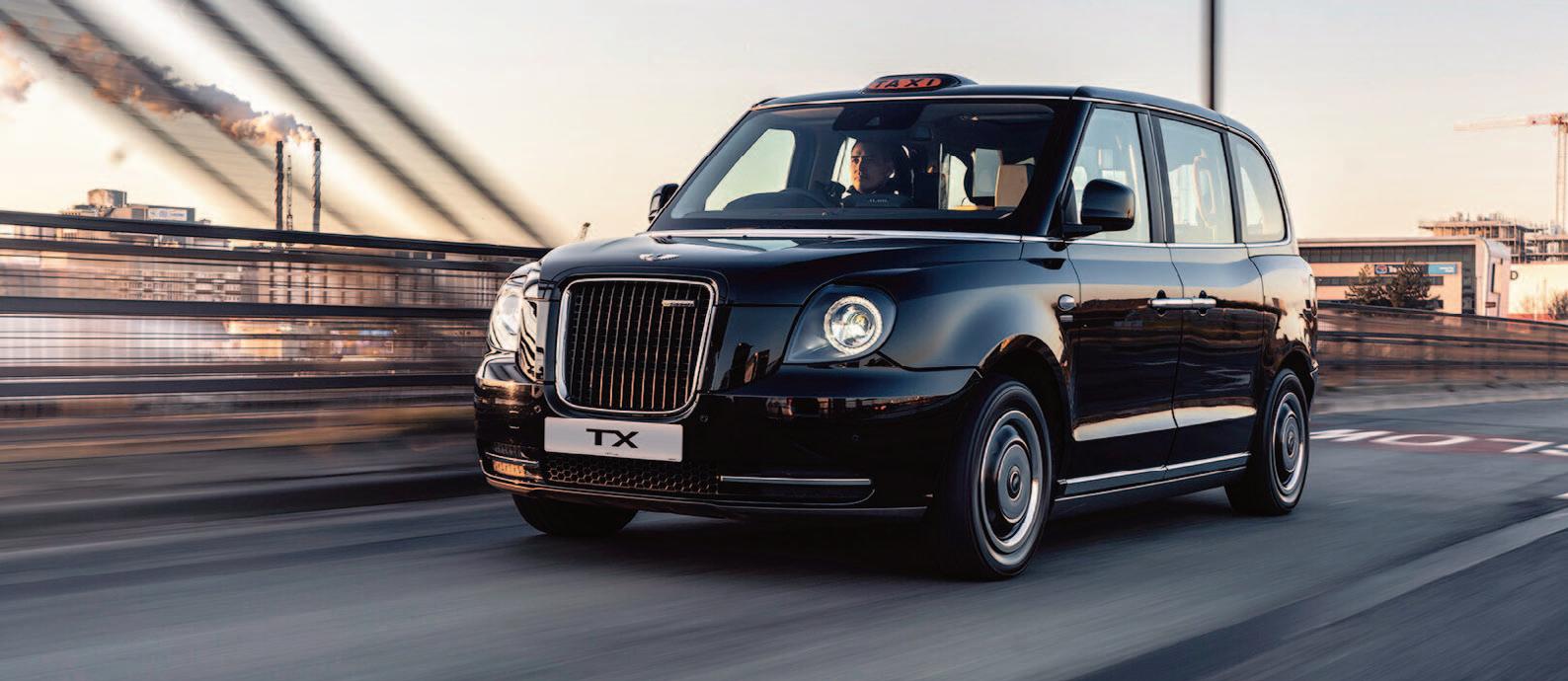
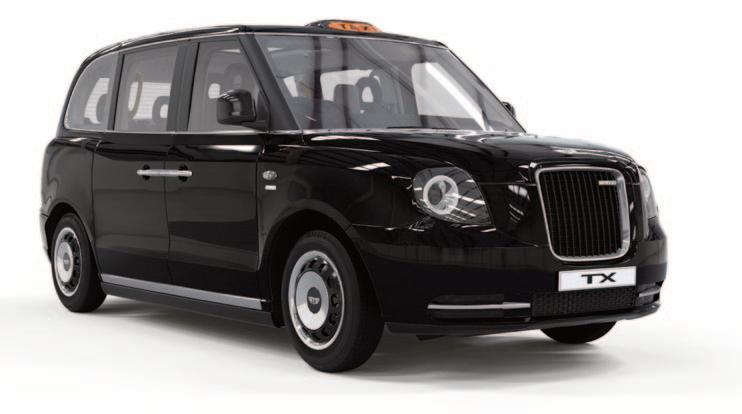
- Central London location
- Back up and support
We are still renting a limited amount of diesel taxis

City Hall maintains its own research proves the scheme is working ‘even better than expected’
Sadiq Khan’s controversial Ulez expansion to outer London failed to lower pollution levels, a report has found.
Bromley Council saw pollutants emitted by vehicles increase after the £12.50 daily charge was imposed last August, its environment committee heard in June.
The council measured no “overall lowering in pollution” in the months after Mr Khan expanded the zone to cover the whole of London, according to the Telegraph.
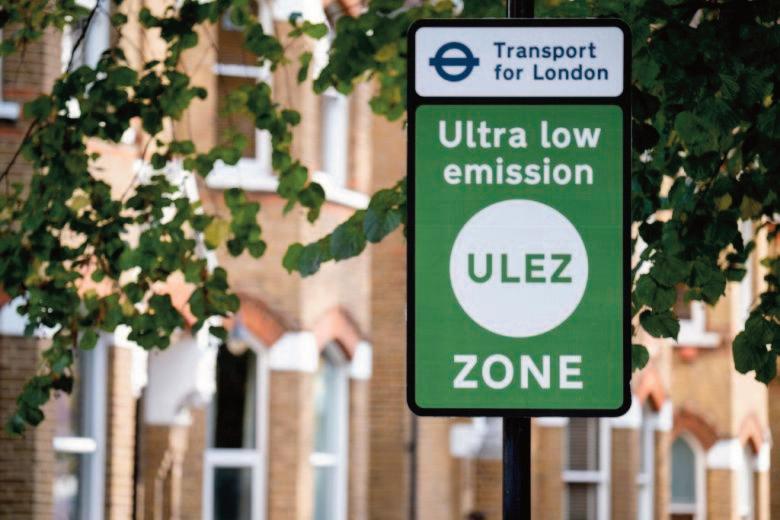
The report claims in November last year, three months after Ulez expansion, levels of pollutant nitrogen dioxide were higher across all the borough’s 32 air quality monitoring locations than they were in the preceding August.
The increase was blamed on “seasonal weather and temperature variations” and only eight of the locations
saw more nitrogen dioxide by December last year than in August 2023.
When comparing the data with 2022, the report concludes: “What cannot be seen at present is an overall lowering in pollution levels that can be directly attributed to the implementation of Ulez in outer London.”
City Hall maintains its own







research - released in July measuring the success of the Ulez expansion in reducing air pollutionproves the scheme is working “even better than expected”.
Bromley councillor Simon Fawthrop, who opposed expansion of the clean air zone, accused Mr Khan of a “tax grab” to raise revenues.
He said: “We always said

that the Ulez expansion would have no, or negligible impact on air quality, so far it looks like we were spot on and Khan was wrong.
“It’s time for Sadiq Khan to finally come clean and confess this was nothing more than a regressive and iniquitous tax grab, by a Mayor desperate to raise revenue.”
Courtesy of the Standard


















Sadiq Khan is extending London’s congestion charge to all zero-emission vehicles from the end of next year.
The move, which will extend the £15-a-day tax on motoring to battery-powered electric vehicles from Christmas Day 2025, was widely condemned on Tuesday.
Mark Harper, former Transport Secretary, said: “Taxing cars even if they’re zero emission shows Labour’s plan to use motorists as cash cows. If they get into government there will be worse to come, with pay-by-mile taxes and fuel duty hikes to help close their £2,000 tax black hole.”
Mr Khan’s office declined to comment when approached by The Telegraph. Over the years, the Mayor of London has spoken extensively about his personal drive to improve London’s air quality by imposing charges and restrictions on motorists, including the Low Emission Zone (Lez) and the Ultra-Low Emission Zone (Ulez).
Transport for London (TfL), which he chairs, confirmed this week that it was proceeding with
plans to remove the current £10-a-year exemption that lets owners of battery-powered vehicles drive in the capital without paying the £15-a-day congestion charge.
A spokesman said the plans were first announced in 2018, highlighting a statement from that year which mainly talked about scrapping exemptions for taxis. The congestion charge exemption does not apply to the Lez or Ulez schemes.
Confirmation on Tuesday that the zero emission vehicle exemptions will be scrapped were condemned by Quentin Willson, a former Top Gear presenter who now campaigns for a faster transition to electric vehicles.
Mr Willson told The Telegraph that the plans seemed “counterproductive” and that his FairCharge UK group would be writing to the Mayor to object to them. “The cynic in me can’t help thinking that this is a revenue-based issue,” he said. “Why are we stopping it now? And they will say, ‘well, it’s a congestion issue’. But then surely, it’s manifestly better to have cars with zero tailpipe

emissions sitting in queues rather than those that are polluting diesel and petrol?
“So to me, it just doesn’t work with his campaign to make London a much greener, cleaner air city. It seems completely counter-productive.”
Steve Tuckwell, who won the Uxbridge and South Ruislip byelection by opposing Labour’s “war on motorists”, said:
“London is the western front in Labour’s war on motorists, and only the Conservatives are fighting to defend drivers.
“Sadiq Khan has let Labour’s mask slip – scrapping the discounts on electric vehicles makes this clear. Labour wants
your car to make as much money as possible for them, whether it’s through Ulez or payper-mile.”
Motoring groups also hit out at the plans. Jack Cousens, the head of roads policy at the AA said: “The London Mayor’s decision to force EV drivers to pay the congestion charge from Dec 25 2025 onwards may be a Christmas present for him. “However, it is a turkey bone in the throat of EV owners who heeded his call to switch to green vehicles and improve air quality in the capital. The key question is: has this decision come about because he hasn’t made as much money as he
thought from the Ulez expansion?”
But Simon Williams, the RACs head of policy, said: “This is a somewhat inevitable step as the journey towards zero-emission motoring has progressed considerably since the congestion charge was first introduced, with more than a million electric vehicles now on our roads. It was put in place to reduce the number of vehicles using central London roads with a view to improving both air quality and traffic flow. And, now we have the Ulez directly tackling air quality, it’s probably only fair that this discount comes to an end as all vehicles, regardless of how they are powered, can create congestion.”
A spokesman for TfL said: “The congestion charge’s cleaner vehicle discount was part of our phased scheme to tackle London’s toxic air. Ending the cleaner vehicle discount from Dec 25 2025 will maintain the effectiveness of the congestion charge, which is in place to manage traffic and congestion in the heart of London.”
Courtesy of The Telegraph
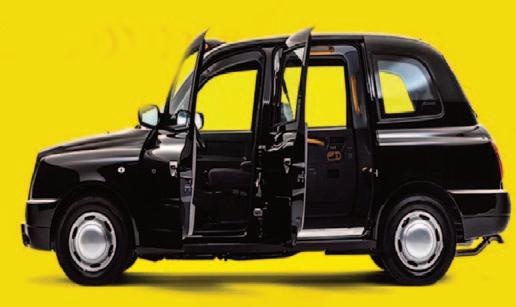


Plans to pedestrianise part of London's Oxford Street have been announced by the capital's mayor.
Sadiq Khan said "urgent action" is needed to regenerate the famous high street, which was has been affected by a shift to online shopping and the Covid-19 pandemic.
“Oxford Street was once the jewel in the crown of Britain’s retail sector, but there’s no doubt that it has suffered hugely over the last decade", he said.
Under the proposal, a 0.7 mile (1.1km) stretch would be pedestrianised between Oxford Circus and Marble Arch, with the potential for further changes towards Tottenham Court Road.
The plan, which was blocked by the previous Conservative-controlled Westminster City Council for its unpopularity with residents, has received backing from Deputy Prime Minister Angela Rayner
She said the pedestrianisation "will drive growth by creating new jobs, generating economic activity, and giving a much-
needed boost to London’s night-time economy.”
The plan will depend on Mr Khan gaining permission from Ms Rayner as housing, communities and local government secretary to establish a new Mayoral Development Corporation, which would provide planning powers and allow the mayor to overrule the council.
The project is expected to cost about £150m, with City Hall officials hoping local businesses, private funders and new revenue streams could foot the bill.
The now Labour-run Westminster City Council, which is responsible for the central London street, said it was blindsided by Mr Khan's plans - only finding out details on Thursday - but it would "work constructively" with the mayor.
Stuart Love, Westminster City Council chief executive, said pedestrianisation posed "practical challenges" and it was waiting for details on "how long it could take to be delivered and how the concerns of local residents and users of the street will be addressed".
The council said it already developed a ready to go £90m plan, half-paid for by landowners, to deliver wider footways and reduced congestion.
But crucially their plan would maintain direct bus access to Oxford Street which they said was important to shoppers, workers, disabled, elderly, and those on low incomes.
Oxford Street is one of the world’s busiest shopping areas, with around half a million visitors each day.
Leading brands such as Topshop, House of Fraser and Debenhams have disappeared from the central London street in recent years, with the pandemic, hybrid working and US-themed sweet stores putting pressure on the street's popularity.
But the New West End Company, a partnership of businesses and property owners in the West End, said in a report this year footfall has been boosted by the Elizabeth line and Oxford Street has managed to attract new flagship stories like Ikea and HMV.
Courtesy of the BBC

In response to the recent announcement from the Mayor of London regarding Oxford Street its Chief Executive, Stuart Love, has issued the following statement:
"Westminster City Council has spent the last two years working closely with businesses and resident groups to develop detailed
important to receive further details about what is planned, including how long it could take to be delivered and how the concerns of local residents and users of the street will be addressed.
“We will want to know how they will benefit from any proposals, particularly given the practical challenges
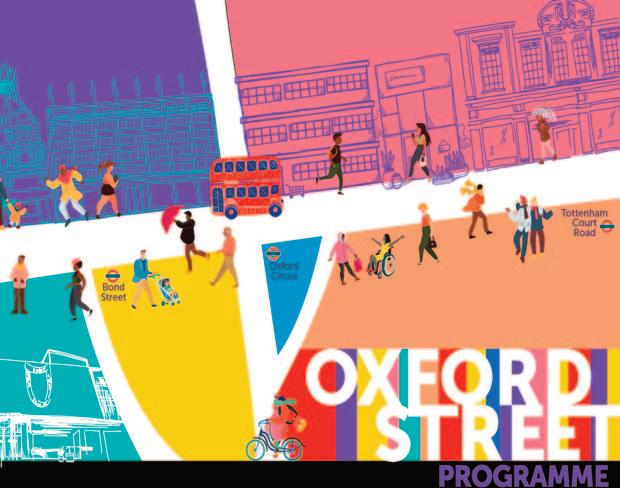
proposals to redesign and improve Oxford Street. These plans are shovel ready, have had the support of retailers and the local community and were intended to deliver significant economic growth whilst also securing a successful future for our thriving neighbourhoods in the West End.
The latest pedestrianisation proposal from the Mayor of London was only shared with us last Thursday. It will be
pedestrianisation may have for the wider area. As a custodian of the West End, our role will be to ensure that local voices are heard loud and clear.
The promise of additional funding for the area is welcome as we are all committed to a successful Oxford Street and thriving wider West End. The Council intends to work constructively with the Mayor and the Government to ensure the best outcomes for local communities, businesses and London.”
On Friday 6 September, veterans and volunteers from the Taxi Charity for Military Veterans gathered at the Ambassador’s Residence in The Hague for a reception, at which UK Ambassador to the Netherlands
Joanna Roper CMG presented Taxi Charity Dutch Adviser Frans Ammerlaan with an honorary MBE.
His Majesty King Charles III awarded an honorary MBE of the Most Excellent Order of the British Empire, to Frans Ammerlaan in gratitude for services to Commemorations and World War Two Veterans.
Frans Ammerlaan has been working with the Taxi Charity as their Dutch advisor since 2010 and became an ambassador for the charity in April 2023.
He founded the Market Garden Foundation, which aims to honour, remember and teach about the Allies who participated in Operation Market Garden in 1944. For over 25 years, the Foundation has meticulously collected, curated and preserved thousands of photographs, extracts of film, maps, schemes, stories and other historical items.
UK Ambassador to the Netherlands
Joanna Roper CMG said, “I am honoured once again to host veterans, their family, and volunteers from the Taxi Charity in The Hague, arriving in a fleet of London Taxis. This year is particularly special as we commemorate the 80th anniversary of Operation Market Garden. It is a privilege to hear the stories from the veterans and an important reminder that we must continue to remember the


bravery and service that they, and their fallen comrades, showed during the Second World War.
It was also a pleasure to meet the volunteers from the Taxi Charity, without whom these visits would not be possible. This year the Airborne commemorations have sought to shine a spotlight on the volunteers who have driven commemorations for the past 80 years. Therefore, it seemed particularly fitting that I also awarded, on behalf of His Majesty King Charles III, an honorary MBE to Frans Ammerlaan, for his service to commemorations in the Netherlands.”
Frans Ammerlaan, Adviser to the Taxi Charity for Military veterans said, “What an honour to have my family and my Taxi Charity friends with me today as I
received my honorary MBE. It was a wonderful occasion and I am very grateful to Ambassador Joanna Roper for inviting us to this reception at her Residence and taking the time to talk to so many of the veterans and the charity volunteers.”
Geoff Roberts a veteran of Operation Market Garden said, “I am absolutely delighted that my great friend Frans Ammerlaan, who has done so much to support and remember those of us who participated in Operation Market Garden has been made an MBE.”
Paul Cook, London Cab Driver and Vice Chairman of the Taxi Charity for Military Veterans said, “ It was an absolute honour to join Frans today as Ambassador Joanna Roper presented him with his
honorary MBE. Frans has worked so hard for our veterans and it is down to his enthusiasm, dedication and tireless efforts that our trips to the Netherlands since 2012 have been possible.”
To find out more about the Market Garden Foundation visit www.marketgarden.com/2010/UK/found ation.html and to find out more about the support the Taxi Charity offers to veterans or to donate visit www.taxicharity.org
Veterans who attended the reception at the Ambassador’s residence were -
Geoff Roberts Kings Own Scottish Borderers
Mervyn Kersh Royal Army Ordnance Corps
Richard Day Royal Welsh Fusiliers
Burma
John Poyner Argyle & Sutherland
Highlanders (post war)
Don Turrell Cameroinans
Peter Smoothy Royal Navy
Robbie Hall WRAF Bomber Command
John King Royal Navy
John Pinkerton Para Reg (post war)
Vic Needham-Crofton Inniskilling Fusiliers (post war)
The Taxi Charity is run by volunteer London black taxi drivers and has been supporting thousands of veterans since 1948. It is the only Forces charity that focuses on providing fun and entertainment and arranges free trips (for veterans from all conflicts) to the Netherlands and France for acts of commemoration and days out to museums, concerts, or social events across the UK.
The charity received the Queen’s Award for Voluntary Service in 2021 and celebrated its 75th anniversary in 2023, a remarkable milestone for a small, niche charity peopled by enthusiastic volunteers. This year, they took a group of veterans to Normandy for the 80th anniversary of D-Day and will be commemorating the 80th anniversary of Operation Market Garden in the Netherlands in September.
To fund and facilitate their work, the charity is wholly reliant on donations, grants and sponsorship.
www.taxicharity.org
Photo: Defence Attaché Piers
Strudwick, Frans Ammerlaan MBE, Ambassador Joanna Roper CMG and Arnhem Veteran Geoff Roberts
A former Scotland Yard chief has raised the prospect of licence plates for bikes as they warned of dangers from rogue cyclists.
Lord Hogan-Howe spoke of his own 'near-death' escape from a rider without lights during a debate in the Upper House.
The independent crossbencher argued that cyclists running red lights and failing to stop at pedestrian crossings was 'just not acceptable'.
Referring to his own 'neardeath experience on Victoria Street' in Westminster, Lord Hogan-Howe - who headed the Metropolitan Police from 2011 to 2017 - said: 'I am not going to say that cyclists are the only threat, because that is quite wrong, that wouldn't be the case at all.
'But I do think there is a case for making sure that pedestrians are protected from the behaviour of bad cyclists... cyclists who behave badly.
'I think it's only fair to note that many good cyclists, cyclists who are behaving well, are harassed and intimidated by those who are behaving badly.
The Justice Secretary has announced in the Commons that prisoners freed under the early release scheme could be housed in taxpayer-funded hotels, once space runs out in community accommodation. Shabana Mahmood revealed that inmates who would be at risk of homelessness on release would be offered the temporary housing for 12 weeks.
'I have heard many cases where cyclists have been doing the proper thing only to be abused and threatened by cyclists who are intending to
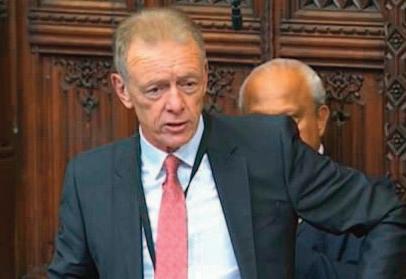
He added: 'I don't think road traffic law has maintained the accountability of cyclists in a way that motor vehicles are regulated.'
Pointing out that riders were not subject to speed limits, the peer told the chamber: 'Cyclists do seem to ignore a lot red traffic lights, pedestrian


crossings when people are on them... that's just not acceptable.'
As well stressing the need to the Government for more comprehensive and accurate data, Lord Hogan-Howe said: 'If they are minded to put more regulation in to make people more accountable, then the consideration of registration marks for cycles, E-scooters
and E-bikes, the insurance of them... driving licences or riding licences which may allow courts to award points as opposed to fines, which on the whole don't work with the same effectiveness, and to make sure we train our young people to make sure they take their responsibilities seriously too.
'I am not against cyclists, I am not a zealot to produce more regulation... but in this case, I am not sure what happens if we don't do something, but then it gets worse. I don't think it's healthy for anyone.'
However, during the debate called by Lord Hogan-Howe a number of other peers warned against regulation amid concerns it would deter people from using the healthy and environmentally-friendly form of transport.
Courtesy of Mail Online

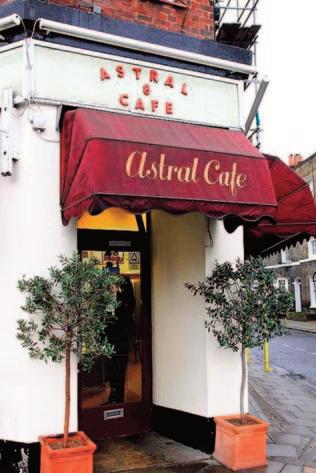
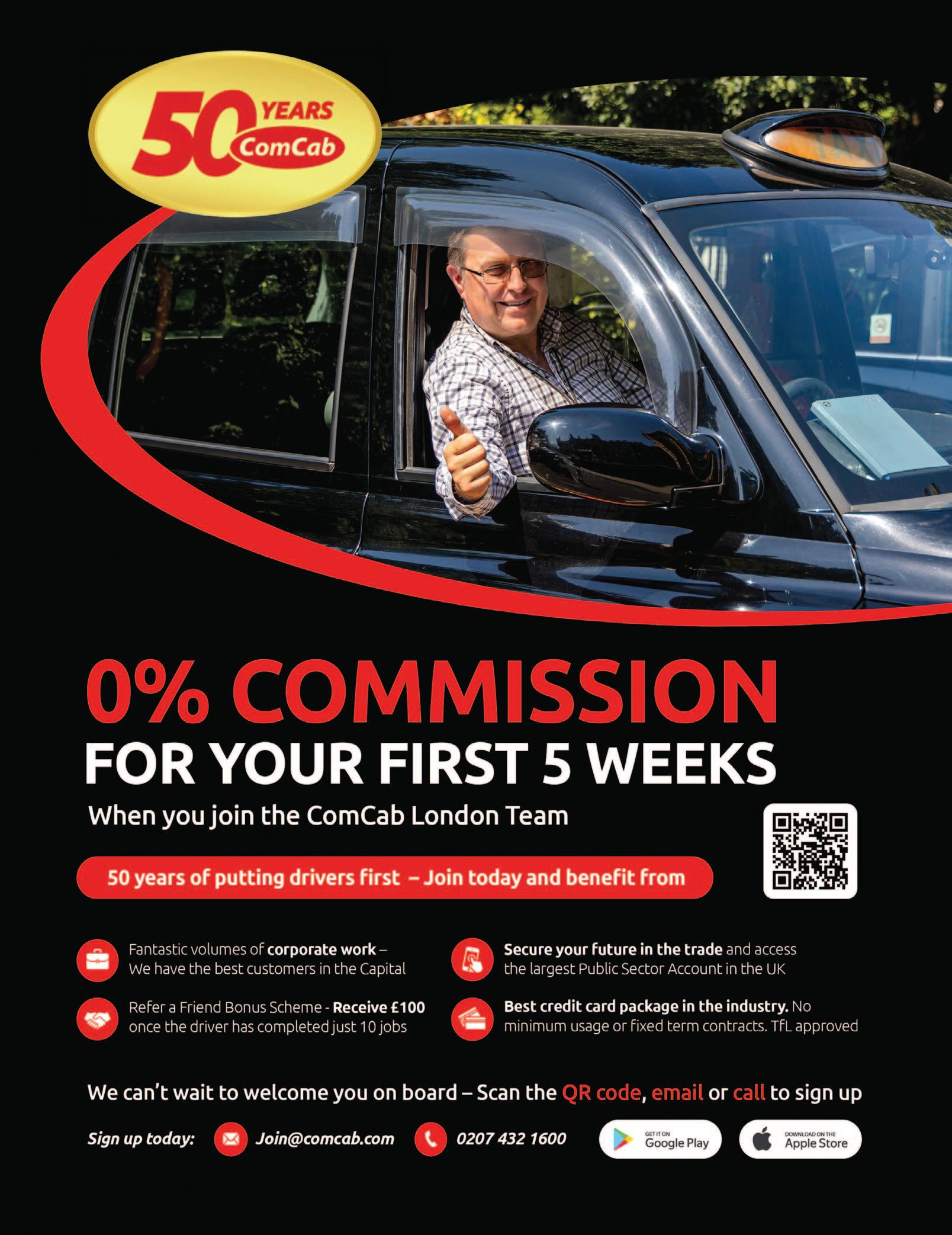



hard on the trade’s behalf for a fairer, and more safer future at Heathrow.
n RANKS AND HIGHWAYS
The LCDC attend the Joint Ranks committee, working hard for more ranks and more access for the taxi trade in London.

Mercedes to deliver a vehicle that meets our standard as a London taxi driver. Recently we have held meetings to work against the ULEZ strategy and the introduction of taxi age limits.
n CLUB PROTECTA
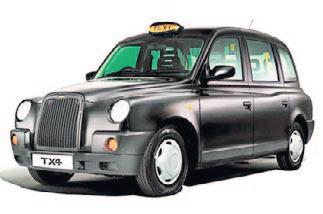
n 24 HOUR DUTY SOLICITOR EXCLUSIVE TO THE CAB TRADE
Your 24 Hr duty solicitor hotline membership card.
Peace of mind 24 hrs of the day.
n LEGAL COVER
Our fantastic team of City Of London based solicitors and barristers, experts in Hackney Carriage and road traffic law.
n COMPLAINTS AND APPEALS
As a member of the LCDC, we will deal with any complaint that has been made against you by members of the public.
Also we will attend the LTPH with you on any personal appeals that would affect your licence.
n HEATHROW AIRPORT REPRESENTATION
With our reps at the airport working
n CAB TRADE ADVICE
All members can call the office for any information or up to the date news on any trade related subject.
n TRADE’S FUTURE
The Club worked tirelessly in bringing in the green & yellow identifiers to the taxi trade.
And are always working hard to protect our future.
n CAB TRADE REPRESENTATION
We are working hard to work with members of the GLA and also politicians to fight our corner against TFL and was a major influence in the recent “ future proof” document.
n VEHICLE MANUFACTURERS
The Club works alongside LTC and
To help drivers who have acquired twelve points keep their licence.


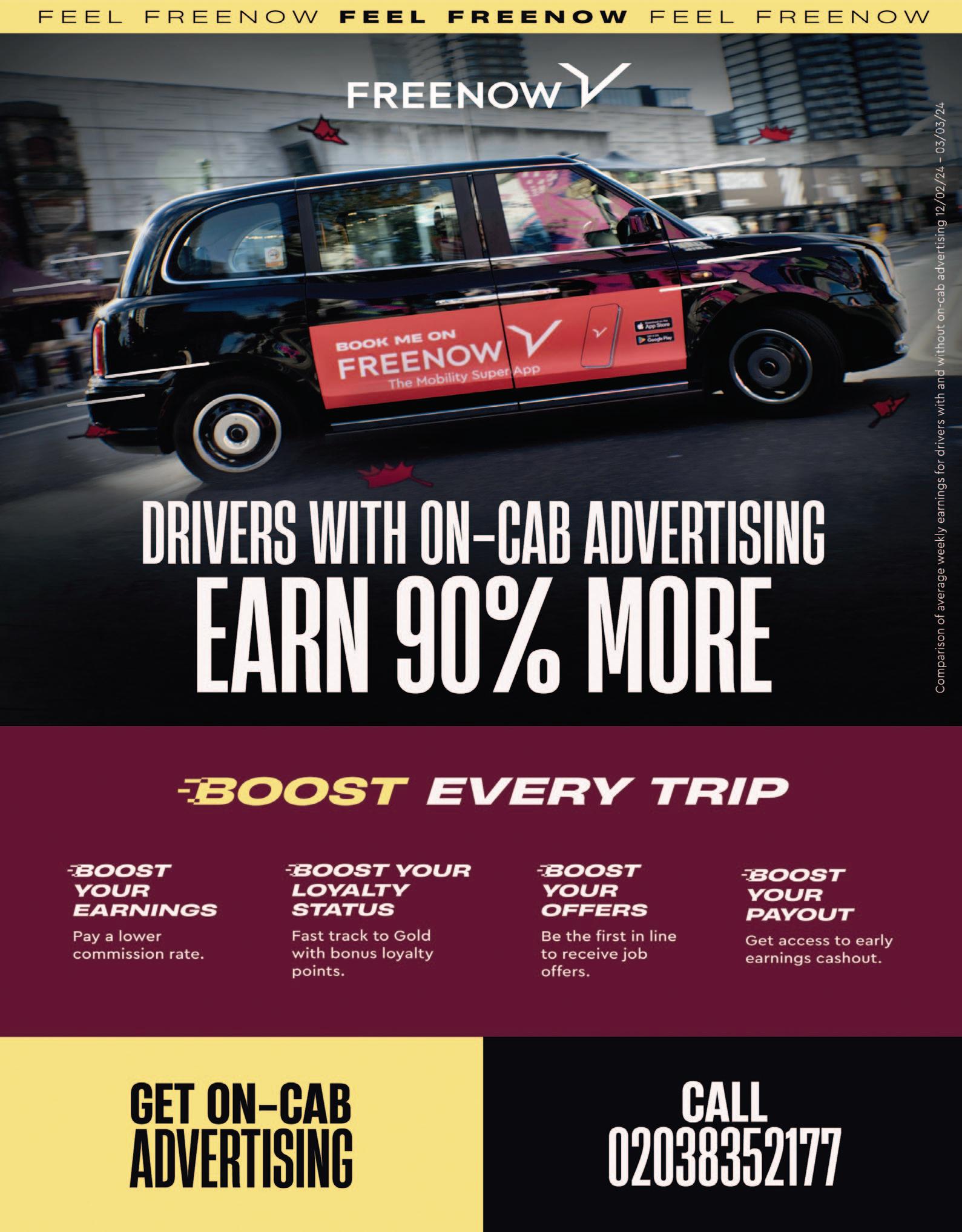
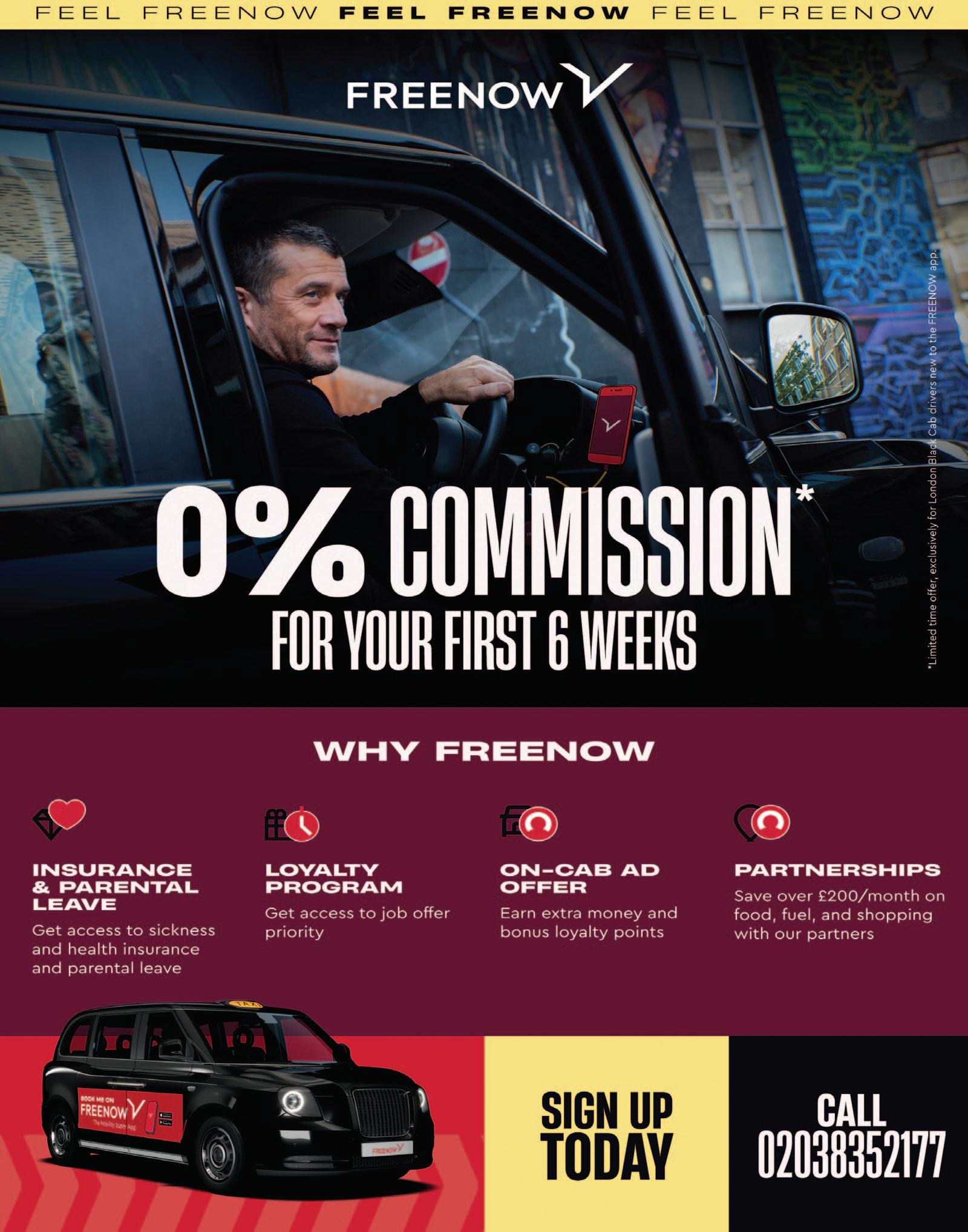
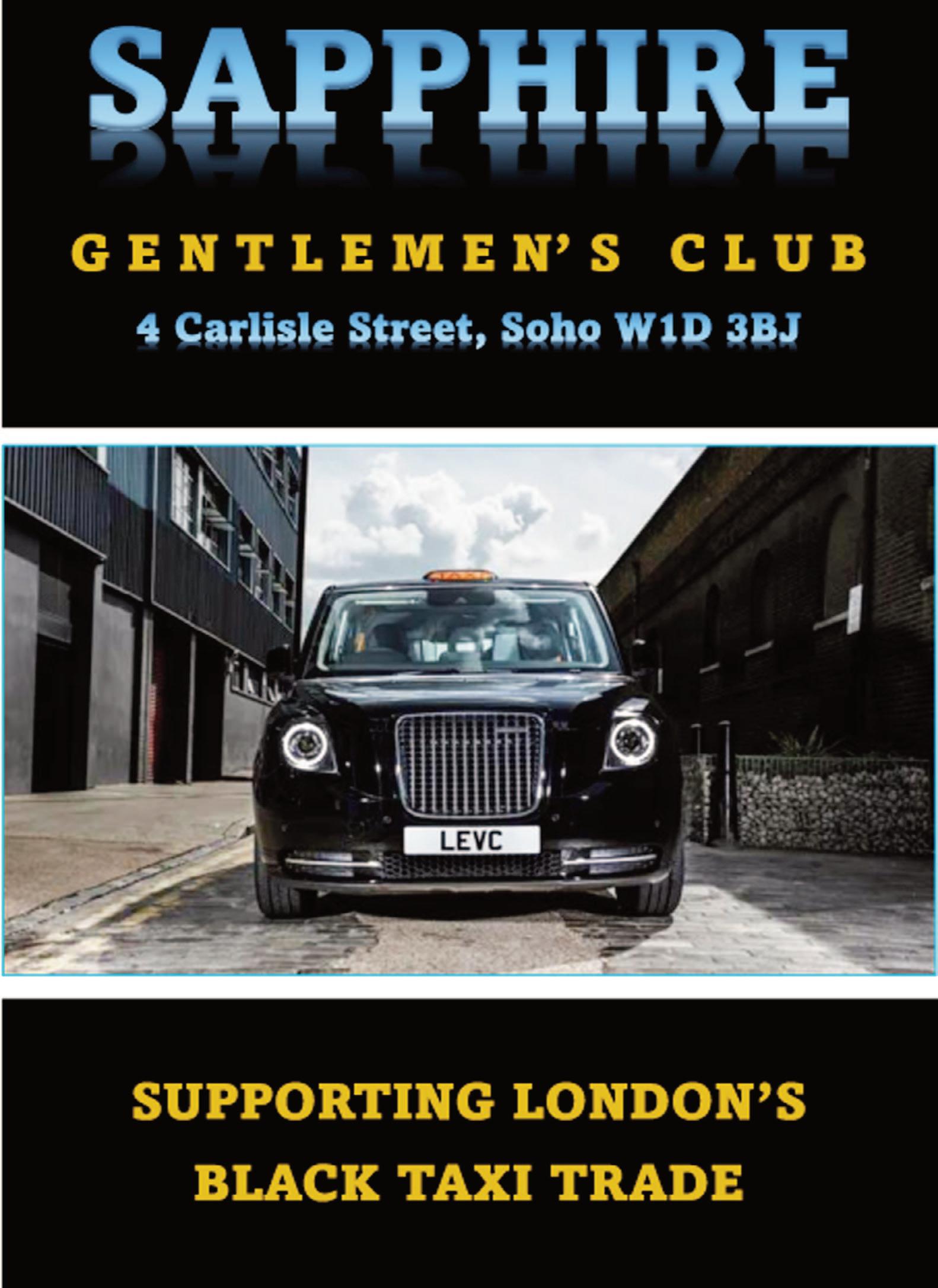

Have any of you noticed the increase in unlicensed vehicles carrying passengers around the Capital?
As many of you may know, I do London Tours for a few different companies, and while out showing people around our Capital City I am increasingly noticing a lot of unlicensed vehicles conveying people about doing tours.
Most of these are these are Mercedes V-Class plus a lot of those white Japanese People carriers plus an old black 60 plate Nissan people carrier.
There are PHV vehicles that currently have an exemption from displaying the roundels in their screens, but I have checked the registration numbers of all these vehicles that I have spotted on TFL’s PHV vehicle license checker, and none of them are licensed by TFL!
The law requires any vehicle transporting passengers for hire and reward needs to be licensed as either a Taxi or Private Hire Vehicle and driven by an appropriately licensed driver, the only things exempt from licensing are Weddings and Funerals.
So how are these unlicensed vehicles getting away with carrying passengers without any form of licensing, they must be getting enough work as some of these are new Mercedes V-Class which do not come cheap.
This also brings up a lot of questions? Who is giving these unlicensed drivers work? Or are these drivers freelance and getting their own bookings through the likes of Trip Advisor? Are TFL aware of the number of vehicles that are conveying passengers around the capital that are totally unlicensed? Are the passengers aware that they are being driven around in uninsured vehicles?
This problem has partly been caused by cross border hiring, there are so many PHV’s working in areas for which they are not licensed that enforcement has become extremely difficult.
We have Wolverhampton PHV’s working in London and TFL has no jurisdiction over these vehicles, they cannot stop and check the driver’s license, and neither can they inspect the vehicles, the only people who can stop and inspect these are the Police and they obviously have better things to do! Now this brings into question the whole validity of PHV licensing because local licensing authorities have no enforcement rights over out-of-town PHV’s.
If a passenger wants to make a complaint about a PHV driver then they would obviously try to make that complaint to the local licensing authority in which they took the journey, but if that vehicle and driver are not licensed locally then who do they complain to? Should a
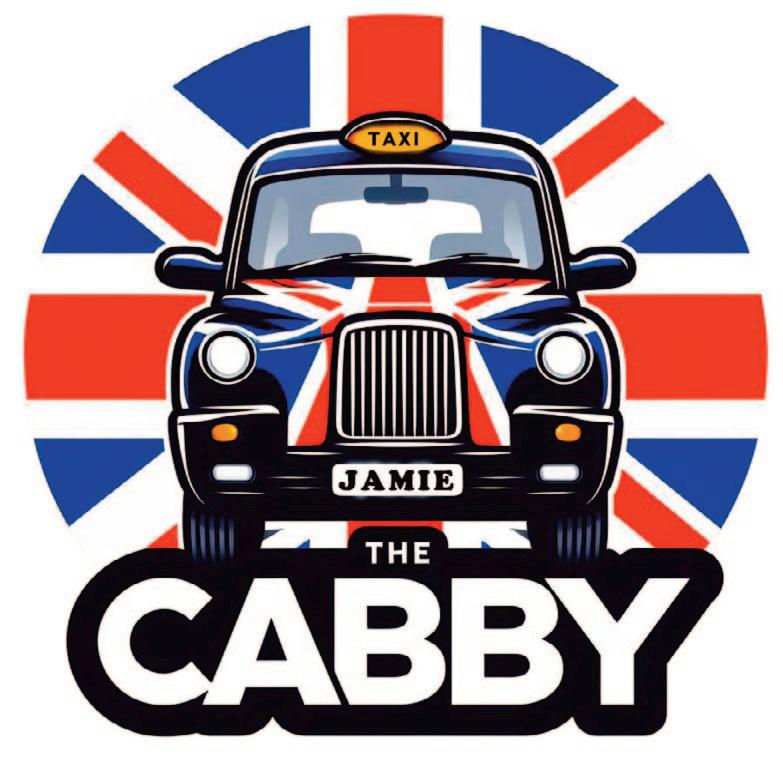
passenger have to go on an epic search to try and find out where that PHV is actually licensed so that they can make their complaint? Of course not, they should be able to contact the local licensing authority and make their complaint. So, what is the point in PHV licensing? The whole aim of licensing what were minicabs in London as Private Hire Vehicles and drivers was allegedly for the safety of the travelling public, but what safety does a vehicle licensed in another town offer to the passenger?
The cynical among us could come to the conclusion that certain towns and cities do not really care about
PHV licensing and treat it somewhat as a cash cow, raising additional funds, and the more vehicles and drivers that they license the more income they gain.
So, in effect we no longer have a 2 tier system of licensing in London, we have multiple tiers of licensed and unlicensed vehicles plying their trade around the streets of our capital city and that is without even considering the rickshaws that seems to plot themselves up on red routes and in bus lanes unhindered by any authority.
Something really needs to be done to address this situation before the whole industry falls into a free for all.
At the time of writing, I am preparing to go on the Magical Taxi Tour to Disneyland Paris where we take 100 Taxis filled with children who suffer from Life Limiting Illnesses on a trip of a lifetime to Disneyland.
This year the charity is celebrating 30 years of taking Children on a truly magical journey. And this will be my 22nd trip to Disneyland Paris with the charity, my first trip being in 2000.
Being part of this magical experience is extremely humbling and if you want to get an idea of what this weekend means to the families you only need to look at the comments on the charity’s social media accounts.
Everybody involved in this trip gives their time free of charge including the committee who work extremely hard throughout the year planning every last detail, the Police, Ambulance crews, the AA, the hospital staff, and especially the drivers as without them this trip would definitely not be possible.
You can find out more about the Children’s Magical Taxi Tour by visiting the website www.magicaltaxitour.com or by visiting the charity social media accounts that you can find @magicaltaxitour.
If you get the chance to take part on this trip, I can honestly say you will find it extremely rewarding but you will get home on the Sunday night absolutely shattered.
I will tell you all about this year’s trip in my piece in next month’s Badge. Until next month, please all be busy, take car out there, be kind and Be Lucky
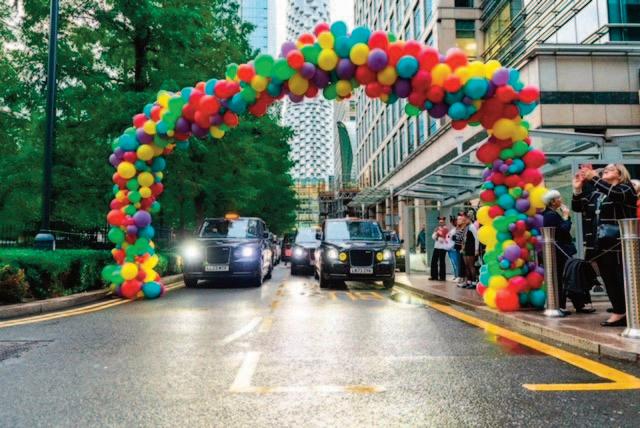
Recent reports from the London Cab Drivers Club (LCDC) have raised serious concerns about Heathrow Airport Limited's (HAL) Surface Access Strategy, which appears to favour Uber and other private hire vehicles (PHVs) over traditional black cabs. The strategy, aimed at improving transport access to and from Heathrow, is accused of undermining fair competition, disregarding the needs of the black cab trade, and putting the future of London’s iconic black cabs at risk.
Uber is aggressively lobbying HAL for better signage and pick-up points that would place them alongside traditional black cab ranks at Heathrow terminals. Uber’s goal is to create “virtual ranks” where passengers can walk straight from the terminal into an Uber vehicle, similar to how they currently access black cab ranks. This move threatens to blur the lines between PHVs and licensed taxis, positioning Uber as a direct competitor to black cabs right on their doorstep.
This strategy could severely damage the black cab industry by diluting the clear distinction between licensed taxis and PHVs. If passengers can simply walk out of a terminal and hop into an Uber as easily as they would a black cab, the unique advantages of black cabs— such as their full wheelchair accessibility, knowledgeable drivers, and strict regulatory standards—are diminished. For passengers, the choice becomes less about quality and more about convenience, which could drastically reduce the number of fares for black cab drivers who rely heavily on airport business.
One of the most alarming allegations in the LCDC report is that HAL may have struck a deal with Uber, potentially exchanging a revenue stream from Uber fares for reduced competition from traditional black cabs and other private hire operators. This suspected
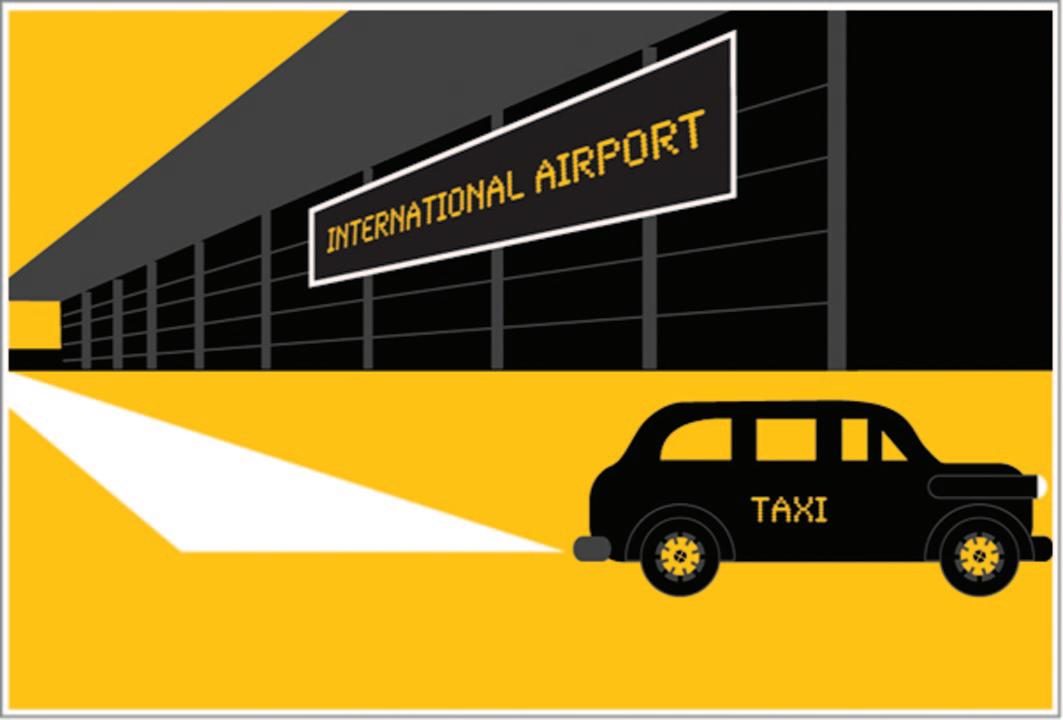
by Mark White
partnership raises serious concerns about the monopolisation of Heathrow’s transport services, leading to fewer choices, higher fares, and degraded service quality for passengers. Such a move would be a blatant violation of fair competition principles and a disservice to the public.
The report highlights that PHVs, like Uber, exploit regulatory loopholes that allow them to operate under less stringent regulations compared to black cabs. This regulatory arbitrage gives PHVs an unfair advantage, enabling them to offer lower fares by externalising costs onto local authorities and enforcement agencies. As a result, PHVs can undercut black cabs, but this comes at the cost of reduced safety, service quality, and increased pressure on public resources.
HAL’s strategy to offer financial incentives and discounts to PHVs contradicts Heathrow's stated goals of reducing private hire trips and honouring its "No More Traffic" pledge. While PHVs are being incentivised, black cabs face mounting operational costs, such as higher taxi feeder park fees and additional drop-off
charges, further stacking the deck against traditional taxis. This uneven playing field threatens the very existence of black cabs at Heathrow, a transport staple with deep roots in London’s history.
The Surface Access Strategy includes a proposal for "backfilling," which would allow PHVs to pick up new passengers immediately after dropping off others, supposedly reducing empty trips and improving efficiency. However, the LCDC argues that this approach will likely increase congestion, as PHVs linger around the airport waiting for their next fare. This not only leads to more traffic and pollution but also creates safety risks for passengers and disrupts local communities as PHVs spill over into nearby residential areas.
Impact on Public Safety and Accessibility Public safety is another major concern highlighted in the report. Traditional black cabs are fully wheelchair accessible, offering a reliable service for all passengers, including those with disabilities. In contrast, less than 0.7% of PHVs in London are wheelchair accessible, and PHVs typically lack the rigorous driver vetting and
vehicle maintenance standards required of black cabs. By favouring PHVs, HAL is indirectly endorsing a reduction in accessible transport options, compromising the inclusivity and safety of Heathrow’s transport network.
Environmental and Financial Implications
The strategy’s environmental impact cannot be ignored. Encouraging more PHV trips contradicts Heathrow's sustainability commitments, as increased traffic leads to higher emissions and worsened air quality around the airport. Financially, the influx of PHVs imposes additional burdens on local authorities, who must manage the increased demand for enforcement and tackle issues such as illegal touting and organised crime—problems exacerbated by the lax regulatory environment in which PHVs operate.
Lack of Representation and Ongoing Challenges
A recurring issue is the lack of representation for the taxi trade in key decision-making forums, such as the Heathrow Area Transport Forum (HATF). Despite repeated requests from the LCDC and other taxi trade representatives, the black cab industry remains excluded from discussions that directly impact their
business. This exclusion means that the concerns and needs of black cab drivers are consistently overlooked, allowing policies that favour PHVs to go unchallenged. There are also internal challenges within the taxi trade, including disputes over the management of taxi operations at Heathrow, the need for a more unified voice, and disagreements about how best to engage with HAL. The LCDC stresses the importance of presenting a united front to effectively negotiate on behalf of the black cab trade and secure fair treatment in airport transport policies.
The LCDC is calling for a reassessment of Heathrow’s Surface Access Strategy and a shift towards a more balanced approach that supports traditional black cabs. Key recommendations include:
1. Increase PHV Costs and Reduce Taxi Fees: Adjust PHV charges to reflect the true cost of their operations, including increased short-stay parking and drop-off fees. Use the
additional revenue to fund stronger enforcement against illegal activities and reduce congestion. Simultaneously, reduce entry fees for the taxi feeder park and lower the cost of electricity for electric taxis to promote sustainable transport options.
2. Eliminate Drop-Off Charges for Taxis:
Removing drop-off charges for black cabs would encourage more passengers to choose licensed taxis, aligning with Heathrow’s sustainability goals and reducing the incentive for PHVs to dominate the market.
3. Scrap PHV Discounts: End any plans to offer discounts to PHVs, as these would only increase the number of private hire trips, further exacerbating traffic congestion and environmental concerns.
4. Establish a Strong Black Cab Presence in Terminals:
The LCDC urges the creation of dedicated taxi desks or similar setups inside Heathrow terminals to protect passengers from touts and ensure that black cabs remain a visible and viable transport option. A strong terminal presence would help maintain the high standards of service and safety that distinguish black cabs from PHVs.
Conclusion: A United Front is Needed
Heathrow’s current strategy poses an existential threat to the black cab trade. By aligning with PHVs and disregarding the contributions of traditional taxis, HAL risks degrading public safety, accessibility, and environmental standards. The LCDC calls on HAL to listen to the concerns of black cab drivers, revise its Surface Access Strategy, and commit to a fair, inclusive, and sustainable transport system that recognises the value of London’s black cabs.
The LCDC urges all black cab drivers to remain vigilant and proactive in defending their interests. It is critical that the trade unites to push back against these changes, secure their place within Heathrow, and protect the future of London's iconic black cabs. The time to act is now, and every cabbie has a role to play in ensuring that fair competition and high standards remain at the heart of Heathrow’s transport network.
By standing together,
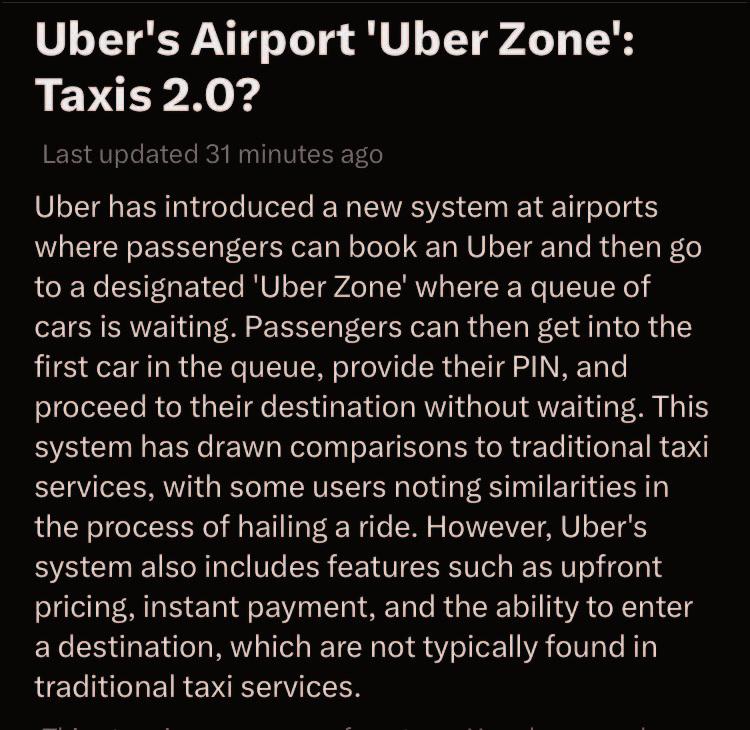
London’s black cab drivers can safeguard their industry, their livelihoods, and the integrity of the service they provide to millions of passengers every year.
The London Cab Drivers Club is advocating for a Heathrow Airport Taxi Trade Summit, with a proposed venue in West Drayton. The aim of this summit is to address the existing divisions among various taxi trade organisations. By bringing all stakeholders together, the goal is to form a unified body that will democratically represent the taxi trade. This initiative seeks to foster greater cohesion and create a single, more effective voice for the interests of cab drivers across the trade.
Airport Reps Press for Dedicated Tout Squad at Heathrow
On 5th September, Black Cab representatives met with TfL Compliance Officers, Dean and Carlo, at the Yiewsley and West Drayton Community Centre. The purpose of the meeting was to discuss the pressing issue of touting at Heathrow Airport, where licensed and unlicensed Private Hire drivers continue to prey on unsuspecting passengers. Unite declined to attend due
to an ongoing dispute with the LTDA, and neither HAL (Heathrow Airport Limited) nor the Police from Cab Enforcement and Aviation Policing responded to invitations, despite being key stakeholders in addressing the problem. Ironically, one of the key agenda items was to request that HAL and TfL fund a dedicated Tout Squad at the airport.
This long-standing issue has been repeatedly raised with the Mayor of London by Caroline Pidgeon at City Hall. Despite years of questions and requests, there has been no meaningful progress on deploying a dedicated team to tackle the problem. The latest round of questions, posed as recently as January 2024, highlights the urgency of the situation.
In one of the more recent responses dated 23 May 2023, TfL acknowledged the high priority of taxi and private hire compliance at Heathrow. While TfL is working with the police to curb illegal activities, they admit that unlicensed touts are primarily dealt with by the police under the Criminal Justice and Public Order Act 1994. Discussions with Heathrow Airport to empower
incident underscores the severity of the problem and the lack of resources dedicated to tackling it.
The failure of authorities to adequately address touting has resulted in dire consequences for passengers. Recently, an American tourist was charged £272 for a journey to Central London. When the same driver returned the tourist to the airport, he was shown a credit card receipt from the extortionate trip. Details of this incident have been passed to TfL Compliance for investigation, but it is emblematic of the widespread exploitation occurring at Heathrow.
TfL enforcement officers under airport bye-laws are ongoing, but no concrete action has yet been taken to introduce or fund a dedicated tout squad, despite repeated requests from the trade.
TfL claims that their officers are regularly deployed at Heathrow as part of "Operation Departure," a plain-clothes operation aimed at catching touts in the act. In the last 12 months, over 40 such operations have taken place, leading to the detection of 23 cases of illegal activity. Furthermore, highly visible patrols have resulted in the inspection of over 800 private hire drivers and vehicles, with compliance rates averaging 80% for private hire vehicles and 85% for taxis. However, the taxi trade remains unconvinced that these measures are sufficient.
One telling anecdote shared during the meeting involved a TfL Compliance Officer who, after returning from holiday, was touted twice at Heathrow—once as a passenger and again while on duty. Despite detaining the tout, the officer had to release the individual after waiting 45 minutes for police assistance that never arrived. This
The fact that TfL officers are often reassigned to tasks like checking bus and train tickets, rather than focusing on tout enforcement, only adds to the frustration. A dedicated team, funded by Taxi and Private Hire license fees, could address the problem more effectively, yet this has not materialised. The recently launched Operation GADI, which used decoy officers and broke up an organized crime gang involved in touting, initially showed promise. However, touts quickly returned to the airport’s terminals, highlighting the need for sustained and consistent enforcement.
Despite these glaring issues and continuous appeals, authorities seem unwilling or unable to listen. Without a dedicated, well-funded Tout Squad, Heathrow remains vulnerable to illegal activity, tarnishing London’s reputation with visitors and putting law-abiding drivers at a disadvantage. The fight for effective enforcement continues, but for now, touts are free to operate with minimal fear of repercussions, while passengers and legitimate drivers bear the brunt of the consequences.
The latest Heathrow Airport Taxi Trade Liaison Meeting took place on 11th September 2024 at the Compass Centre. The session, running from 14:00 to 15:30, covered several critical topics for black cab drivers operating at Heathrow. Here's a rundown of the key discussions: Terminal Drop Off Charge
Tom Prowse delivered a presentation on the Terminal Drop Off Charge (TDOC), which currently makes up over 71% of forecourt movements at Heathrow. Despite this significant share, there’s a proposal to increase the TDOC fee by £1 (20%), bringing it to £6 starting from January 2025. Notably, this price hike will be subject to regulatory scrutiny during the airline consultation this August. Annual reviews of TDOC will be linked to roll-up pricing changes.
For taxi drivers, there's a temporary £1 exemption until April 2025. This exemption is in place while the TfL consultation remains open. Steve Jones from the United Cabbies Group (UCG) also raised concerns about the lack of forecourt parking enforcement, which HAL say will be addressed with the Landside Ops team.
A request for more information on the Blue Badge exemption usage was put forward by Sam Houston of the LTDA. Heathrow will provide figures on this soon. In addition, the postcode look-up tool for TDOC appeals is currently not functioning, and Heathrow is investigating this issue.
Wildlife and Airside Concerns
Drivers were reminded to properly dispose of rubbish landside to prevent increasing wildlife activity on the airfield, which poses operational risks.
There were no police present at this meeting. However, drivers were urged to report any suspected touting in the terminals by contacting the non-emergency APOC number (020 8745 7216).
Replacement Tags
To date, 440 new tags have been issued, though there was some confusion about whether this number refers to tags released or contacted drivers. Clarification is being sought.
Scott Wolsey of the RMT Union flagged the shortage of tags, noting that although Heathrow has over 7,500 registered tag users, only about 2,500 are regulars at the airport. Further analysis of tag data will take place to resolve this issue. RMT Rep Scott Wolsey called for all 800 Drivers on the waiting list
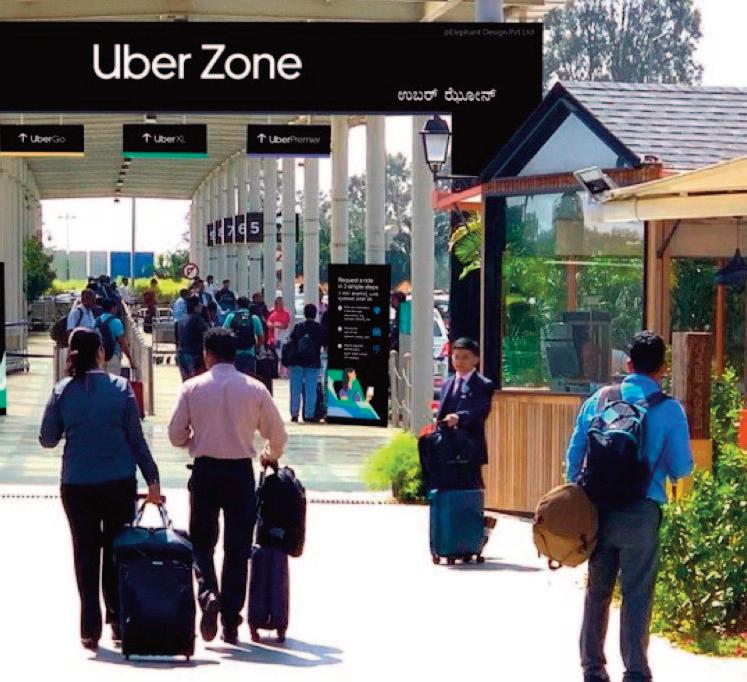
to be given Tags immediately. However, he seemed to be unaware that it was HAL who had unilaterally stopped the issuing of Tags amid Health and Safety concerns, with too many taxis trying to enter the Feeder Park after complaints from the Police and neighbouring businesses, not the Taxi Trade.
The question of switching to a metered fare system for certain Out of the Met journeys was raised by the LCDC, but any potential changes will need to be explored further with APCOA. As agreed, this topic will be removed from the agenda until the unions provide an update. It’s been almost 6 months since the Tariff increase and Fair Fares have remained unchanged. The RMT’s Rep did not want an increase despite fares often being below the meter and refused by drivers. Meanwhile, as there was no agreed increase, LCDC
suggested that Fair Fares be changed to metered fares with a minimum charge as a solution.
The trial, managed by Suzanne Sullivan of the LTDA, saw the issuance of 106 polite notices to drivers across different shifts. The difference between day and evening shifts is being closely monitored.
Grundon has successfully completed a waste analysis and is happy to swap one bin in each lane for a 'mixed recycling' bin. However, unions have requested additional bins and for bins to be placed at both exit chutes to meet the increased demand.
Matthew Wooll from HAL Surface Access raised concerns about potential short journey destinations
that black cab drivers may not favour. In response, the unions clarified that there are no destinations drivers refuse to serve except Car Hire and Business Parking due to inadequate drop off facilities. This information will be relayed back to Surface Access.
An important issue raised was whether wardens are covered under Public Liability Insurance within the Taxi Feeder Park (TFP). This matter will be investigated further with the Legal team.
The LCDC have continuously been asking HAL to allow all the Trade Reps/Orgs to use the two offices that used to be used by HALT as part of the contract to govern the Taxi Feeder Park paid for via the entry fee. To say we have
been fobbed off is an understatement. It is imperative that this office space is used to support a new entity so that the taxi trade can have a Taxi Desk trial. The entity needs a registered office and all the drivers who enter the Feeder Park have been paying for the two rooms which the LTDA & Unite occupy free of charge. It is our opinion that this is both unfair and wrong. We will now be contacting the other trade organisations involved, but our feeling is that HAL do not want us to attend meetings or go ahead with the scheme, therefore it might be time to pull out and contact the CAA instead. Drivers should not be paying for a facility that they do not have access to.
The next liaison meeting is scheduled for 6th November 2024 at 14:00, in Room Istanbul at the Compass Centre.
Anyone walking through the centre of London can’t help but be struck by the stark contrast between the multi-million pound buildings which surround them and the all-toocommon sight of the homeless who can be found living in tents, begging, and rooting in bins.
In Park Lane, where the hotels often have a Bentley or Rolls Royce parked outside, there is an encampment largely made up of Roma from Romania, who beg during the day and then retreat to their tents at night, to bed down only a short distance from the rich.
The incongruity between these sights hasn’t gone unnoticed. The YouTuber Wesley Winter has nearly half a million views for a video where he went to the encampment in order to interview some of the Roma there. They candidly admitted they’d come to London to beg and send the money home with Moneygram.
Although pitiable, some of those living on the streets are more dangerous. Last month Ioan Pintaru, a Romanian of no fixed address who required an interpreter in court, repeatedly stabbed an eleven year-old girl visiting Leicester Square with her parents. Thankfully she survived, but will likely require plastic surgery.
This is hardly the image of London which Britain wants the world to have. Although begging and rough sleeping have a long history, in the 1990s it was largely British or Irish people, many of them addicts. New Labour successfully managed to get most of them off the street, through a combination of government targets and increased investment.
That changed with the enlargement of the EU to include countries like Romania, bringing a sudden influx of immigrants, including professional beggars. A large

proportion of Big Issue vendors, which was traditionally intended to be sold by the homeless, are now Roma. Some of them even have somewhere to live but instead sold the magazine to take advantage of a loophole which allowed them to claim they were self-employed and therefore eligible for benefits.
According to the Greater London Authority, 55 per cent of the homeless in London are not British. The largest groups include Romanians, Poles, Eritreans, the Sudanese, and Indians. Those numbers may be even worse because the most recent CHAIN report on rough sleeping had to exclude the 404 people whose nationality is unknown. Most of them were men and large numbers of them had problems with alcohol, drugs, and mental health – or all three. That said, 30 per cent had no such issues.
When former Home Secretary Suella Braverman said rough sleeping was a “lifestyle
choice” for some she was roundly attacked by charities and other politicians – but official statistics and the interview of the Park Lane Roma back her up. For some people, choosing to live on the streets and beg is a genuine choice.
Putting rough sleepers into accommodation is expensive and potentially rewards those who are willing to behave badly, leapfrogging those who are equally deserving but played by the rules. Temporary accommodation for the homeless is already
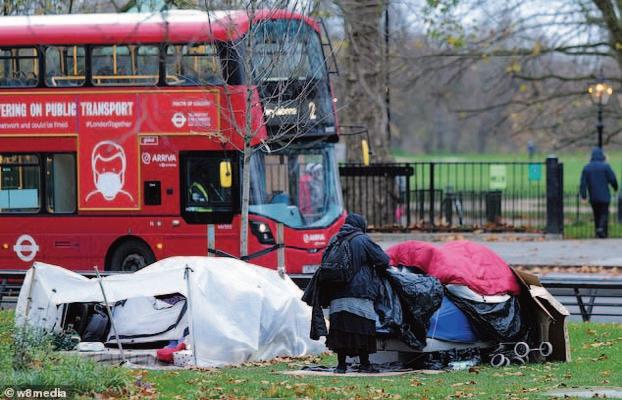
It is, nonetheless, a poor one, as the squalor of their camps shows. Eking out a living on the margins of our rich society is degrading and dangerous.
overwhelmed and often of very poor quality. The large number of asylum seekers and the high grant rate of asylum mean that in recent years the Home Office has shifted significant
numbers of homeless refugees to cash-strapped local authorities, who struggle to find places for them.
The ultimate problems here are a sclerotic planning system which limits the number of new homes built and a high level of immigration which ensures that what is built isn’t enough to keep up with new demand. The government has signalled an intention to act on both but so far has failed to take robust enough action.
In the short term therefore they could seek to reduce the problem by concentrating on the foreign rough sleepers. Although some, such as Eritreans or Sudanese, can’t be removed home due to their countries not being safe, many of those from Eastern Europe or India could and should be sent home. While some may blanch at targeting them, it is more compassionate than leaving them on the streets as winter comes in.

Back in a previous life, during the mid to late 1990s, I used to oversee a club night in South London called Mono Media. There, we’d invite local DJ’s to play a wide variety of music, all of which was, shall we say, on the niche side, and the club night was all the better for it.
One evening, whilst I was chatting at the bar, Claire, one of our regular DJs played Gimme Shelter, performed by a female vocalist, who I didn’t instantly recognise. I was straight over to the decks and asked Claire who it was. She explained it was the very same Merry Clayton who had sung the backing vocal on the original by the Rolling Stones. For a change, I shut up and listened and to say the least, I was blown away . To this day I find it hard to say which is the better version.
Despite her relative anonymity then, which remains in some quarters today, Clayton has left an indelible mark on the music industry. Through her soulful and commanding delivery, she has lent her talents to countless iconic recordings and garnered a reputation as one of the greatest backing singers in history. From that unforgettable performance on Gimme Shelter to her solo endeavours, her powerful voice has graced numerous genres, infusing each song with raw emotion and undeniable soul.
She was born on December 25th (hence the Christian name) 1948, in New Orleans, Louisiana, the daughter of mum Eva and father, the Reverend A.G. Williams, Sr. Growing up in a musical family, she was exposed to gospel music from an early age at the New Zion Baptist Church in her father’s parish. Her vocal talent quickly became evident, and she began singing there and in other local churches from the age of 6 . She picked up the nickname ‘Little Haley’ due to her mimicry of gospel legend Mahalia Jackson, a friend of her fathers.
‘I would always find my way to nestle up right up under Mahalia wherever she was sitting. I would lean up against her and take a little nap because I would have been up since seven o’clock that morning.’
In the 1960s, Clayton and her
family moved to Los Angeles and she embarked on her professional music career. She soon found herself in high demand as a backing singer, lending her distinctive voice to recordings by notable artists such as Ray Charles, Elvis Presley, and later Neil Young. Her powerful and versatile vocals became sought after for her ability to elevate any song she touched. Her first recording was aged just 14, duetting with Bobby Darin on Who Can I Count On? Like all good mums, Merry’s laid down some ground rules.
‘When you pick her up from school, she has to take a nap so that she can be refreshed. And then you have to correct her homework. So, Bobby Darin did my homework…’
Another highlight came in 1963, when she sang on the original recording of The Shoop Shoop Song (It’s in His Kiss)
As touched on earlier, perhaps her most iconic moment came in 1969 when she recorded those chilling vocals for the Rolling Stones. Her spinetingling duet with Mick Jagger on the chorus became the song’s defining feature, adding a haunting intensity that captured the turbulent spirit of the era.
Mick Jagger – ‘(we thought) it’d be great to have a woman come do the chorus. (She was) pretty amazing.’
Merry had taken a random phone call from producer Jack Nitzsche to take part on the session, in the middle of the night. Theredore, she turned up at the studio with her hair in curlers, in her pyjamas and 4 months pregnant.
‘(I’m thinking) these boys want me to sing about rape and murder. I was tired, it was cold, and my voice cracked. We listened back and they said:
‘Oh that’s bloody fabulous. Can you do it again?’
Sadly, she suffered a miscarriage the day after.
‘We lost a little girl. It took me years and years and years to get over that. You had all this success with Gimme Shelter

and you had the heartbreak with this song. It left a dark taste in my mouth. It was a rough, rough time.’
She married the jazz musician and Ray Charles’ musical director, Curtis Amy in 1970 and they remained together until his death in 2002. They have a son called Kevin. Also, in 1970, she recorded her own version of Gimme Shelter (the very one I heard all those years later) and it peaked at number 73 in the charts. She also sang on the soundtrack to the film Performance.
She pursued her solo career, with albums such as Merry Clayton from 1971 and in 1972, she played the Acid Queen in the first on-stage production of Tommy by The Who at The
Rainbow Theatre. Other notable moments in the 1970’s include BV’s on Sweet Home Alabama by Lynyrd Skynyrd and Rock Creek Park by The Blackbyrds and her version of Southern Man by Neil Young. The 1980s saw her hit the charts with the song Yes from the 1987 film Dirty Dancing. Despite her undeniable talent, Clayton’s solo career did not achieve the commercial success she deserved. However, her contributions as a background vocalist continued to flourish. Her collaborations extended to other artists like Carole King on Smackwater Jack and Joe Cocker on Feelin’ Alright, adding her distinct touch to their recordings.
Rightly so, she was prominently featured in the Oscar winning documentary 20 Feet from Stardom from 2013 which highlighted legendary background singers and their contributions to the music industry.
A year later in 2014, she suffered a devastating car accident that resulted in the loss of both her legs below the knee. Perhaps thankfully, she has no memory of the accident or her five months in hospital. Her main concern was her voice. Upon hearing it was unaffected, she broke into song. Her sister said ‘If she’s singing, she’s fine.’ ‘It was like I was in another place; I knew I was here in the world, but it was just like I was somewhere else. I was in la-la land. I have friends who’ve told me: ‘Girl, if it were me, they would have had to put dirt on me – God knew who to put this on because I couldn’t bear it. You’re a walking, talking miracle.’ And I really, truly believe that, because I refuse to give in, and I refuse to give up.’
Despite this tragedy, Clayton’s resilience and love for music prevailed. She embraced her new reality and continued to sing and perform, adapting her approach to accommodate her physical challenges. Her determination and unwavering spirit inspired fans and fellow musicians alike.
Her story is a testament to the enduring power of talent, perseverance, and resilience. Despite facing personal setbacks, she never let go of her passion for music. Her ability to channel raw emotion through her voice continues to captivate audiences and serves as a reminder of the profound impact that a gifted vocalist can have.
The Mumper of SE5
Read The Mumper’s other weekly musings on ‘The Speakeasy’ blog page https://www.artgalleryclothing. co.uk/blog/
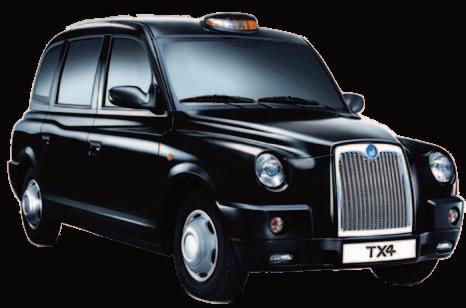






He entered the ring as both the world heavyweight champion and the underdog at the end of a week where he was certainly not the star attraction.
Daniel Dubois changed the heavyweight landscape on Saturday night at Wembley Stadium when he dropped Anthony Joshua four times in a heavyweight fight for the ages.
Dubois was too fast, too smart and before the dramatic singleshot finish in the fifth round, he had bullied Joshua during a fight that few in the boxing business had dreamed would happen, with ‘AJ’ forced to clarify his future due to the nature of the loss.
An exuberant Dubois asked the remnants of the 96,000 crowd during his post-fight interview in the ring: “Were you not entertained?” Joshua had slipped away, his eyes wide open to the disaster of the night and his future as uncertain as his legs had been unsteady for most of the fight. He will continue, there might even be a rematch.
The night belonged to Dubois, and it was, it needs to be said, an unlikely coronation. He called himself the “king slayer” and there is no arguing with that, but his passage to glory has been hard and his fourknockdown slugfest was not an easy prediction.
Dubois turned professional in 2017, he was just 19 at that time and there was a lot of pressure on him. The storyline was simple: He would be the next heavyweight champion of the world. He easily biffed and bashed his way to 14 knockouts in 15 wins and an early showdown with Joe Joyce, who had won an Olympic silver medal. The unbeaten pair met late in 2020, under Covid conditions behind closed doors, and Dubois, with an eye closed from punishment, went down on a knee in round 10 of 12. It was a shocking end and there is no easy way to disguise the finish. It was a crisis – the response would be critical. After a few easy wins, including a mad dash to Florida to win a version of the world title, Dubois was matched with a former cruiserweight from South Africa called Kevin Lerena. It was outdoors at Tottenham Stadium

on the night Tyson Fury stopped Dereck Chisora. Dubois won in the third, but he was stunningly dropped three times in the opening round. The truth is, it looked like Fury and Joshua, and the rest of the elite heavyweights were operating far above his head.
In the summer of 2023, Dubois was stopped by Oleksandr Usyk in Poland in a heavyweight title fight that
created more questions than answers. Usyk was dropped heavily by a body shot – yet the referee deemed it illegal; Dubois and his people believed it legitimate. Usyk took the extra minutes to “recover”. A few rounds later, Dubois was down on a knee after a jab. It was an unsatisfactory ending.
The controversy of the lowblow incident neatly shielded attention away from the
dubious ending. However, Frank Warren, the boxer’s promoter, had to have a serious talk with Dubois. There would be no more gentle fights to get easy wins; it would be sink or swim for Dubois. The choice was his to make and he accepted two fights against unbeaten boxers in Saudi Arabia and started both as the underdog.
Last December, Dubois

stopped Jarrell ‘Big Baby’ Miller in the tenth and last round, then in June, he halted Filip Hrgovic on cuts in the eighth round. In both fights, Dubois had to show tremendous resilience and courage. “It’s my redemption story,” he said after stopping Hrgovic and winning the IBF’s interim heavyweight title; a month later, he was upgraded to full champion and that belt was on the line against Joshua.
On Saturday night, the knockdowns of Joshua were impressive, but not as impressive as the way Dubois controlled and pushed Joshua from corner to corner. Dubois fought like the seasoned veteran and even at the end, when he had been caught and backed into a corner, there was no panic. As Joshua moved in, connecting with two big rights, Dubois picked an opening for a single, sharp counter and down went Joshua for the full count. It was a chilling finish, beautifully constructed under pressure from a man who has been under pressure since that first professional fight.
Dubois has now answered all the questions from the bad nights, the rest of his career will be his proper history.


All under one roof
• Exclusive Insurance schemes
• Breakdown cover only £99
• Roadside assistance and recovery
• Recovery to any UK Location